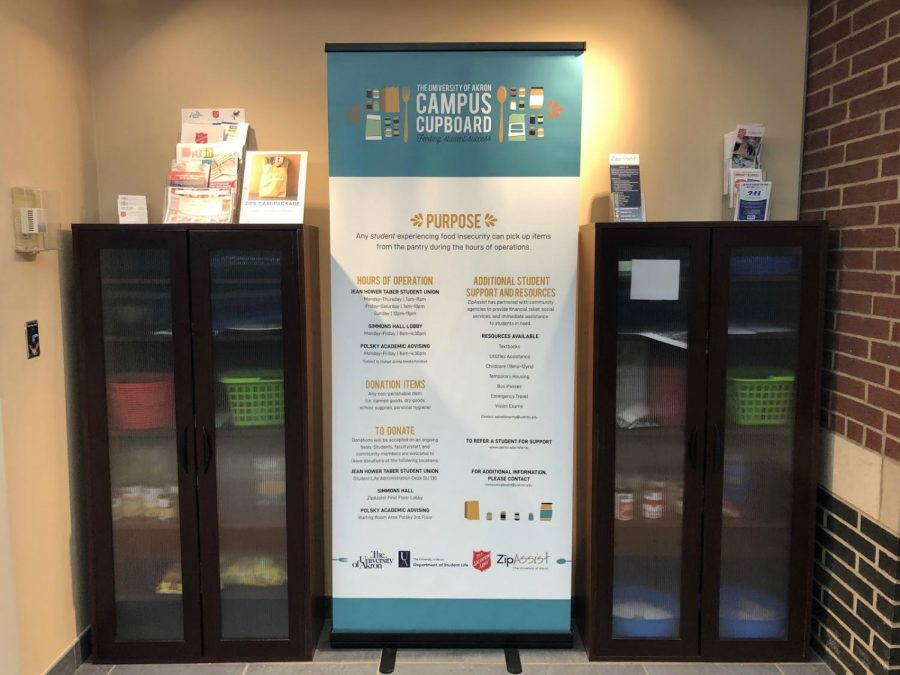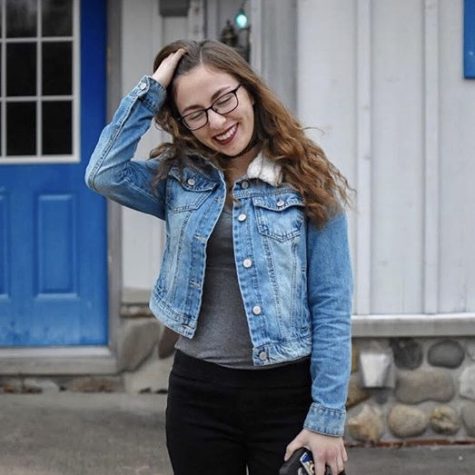Campus Cupboard Provides Assistance for Students Facing Food Insecurity
Four locations on campus provide students with access to non-perishable food and hygiene items.
The Jean Hower Taber Student Union “grab-and-go” location.
March 13, 2020
According to a survey from The Hope Center for College, Community and Justice, 45% of 86,000 college students described themselves as “food insecure.”
ZipAssist is helping students at The University of Akron facing food insecurity through its Campus Cupboard initiative.
This program unofficially began in the Fall 2017 semester after ZipAssist staff members noticed that students often listed food as one of their primary concerns during Student Emergency Financial Assistance (SEFA) meetings.
“It was evident that some students were struggling to meet basic needs,” Alison Doehring, Director of ZipAssist, said.
ZipAssist partnered with the Salvation Army of Summit County in order to make non-perishable food items available to students. Later, “grab-and-go” locations were placed in Simmons Hall and the Jean Hower Taber Student Union in 2018.
UA’s Undergraduate Student Government (USG) helped with funding for items in the student union “grab-and-go” location.
The “grab-and-go” locations are accessible at all times. Students are asked, but not required, to fill out a brief demographics survey when taking items in order to help Zip Assist and the Salvation Army more effectively provide support.

The Campus Cupboard aims to assist University of Akron students who are dealing with food insecurity.
Campus Cupboard became formally recognized in the Spring 2019 semester after adding a third “grab-and-go” location in the Polsky Building and multiple meetings between USG and ZipAssist
“Between March 2019 and December 2019, over 13,000 items were accessed through the three grab-and-go locations,” Doehring said.
After seeing the number of resources that the “grab-and-go” locations provided to students, ZipAssist decided to reallocate a space in Simmons Hall for a walk-in pantry area in December 2019.
The walk-in pantry offers items that are not available in the “grab-and-go” locations, such as full-size cereal boxes, jars of peanut butter and full-size boxes of feminine hygiene products.
In order to gain access to the walk-in pantry, students must speak to a member of ZipAssist. In addition, students are required to fill out the demographics survey if they take items from this location.
For students who might be unable or reluctant to visit the walk-in pantry, ZipAssist created the Zips Care Package program as another option to receive the assistance they need.
Doehring said ZipAssist understands that it may take a large amount of “pride and vulnerability” on part of the student to ask for help.
“This is another support mechanism and way for a student to protect their anonymity while still receiving assistance,” Doehring said. “For a student who is not yet ‘ready’ to come to the walk-in space, this is an easy way for them to access needed items.”
To receive the Zips Care Package, students can fill out a request form online and detail the kinds of items needed. A ZipAssist staff member will then place them into a discreet bag that can be picked up at the ZipAssist desk in Simmons Hall.
Overall, ZipAssist programs focus on providing “gap assistance” to students through short-term help in overcoming unexpected obstacles, including financial emergencies and academic, personal or mental health concerns.
ZipAssist plans to expand the Campus Cupboard in the future by bringing another “grab-and-go” location to the east side of campus and supporting USG efforts to provide feminine hygiene products in restrooms across campus.
“I would love to see us provide access to fresh food items,” Doehring said. “Wouldn’t it be wonderful to have access to fresh food that was even grown on campus?”
Doehring also emphasized the variety of resources that the ZipAssist program provides to students.
“If a student is experiencing hardship, finding themselves short of money, needing guidance, looking for resources—you name it—I encourage them to complete the Help-A-Zip Referral Form,” she said.










